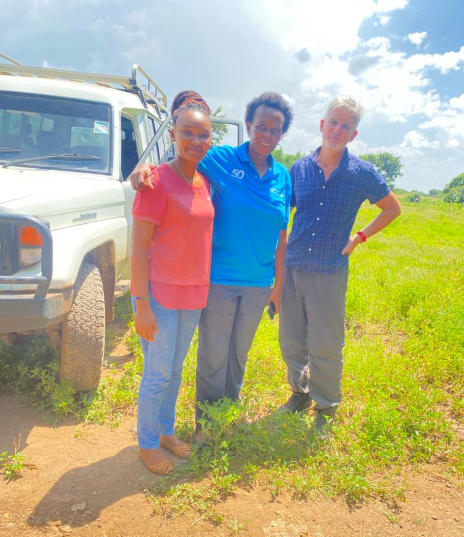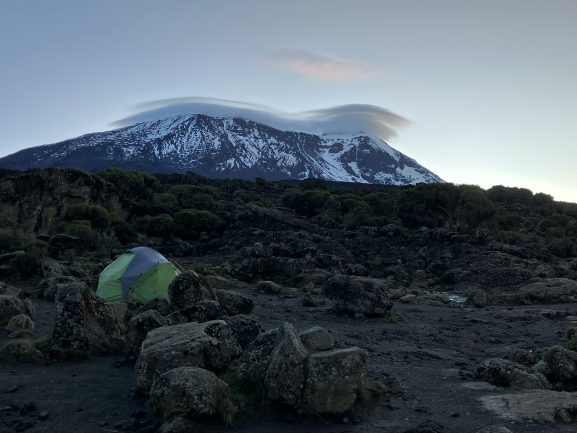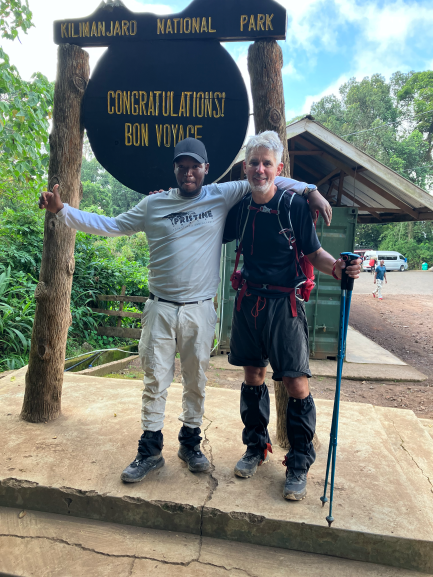Duke Palliative Care Global Health - KCMC Palliative Care Intensive

It's a rare opportunity to be reminded of how fortunate we are and to appreciate all of the health care resources that we take for granted. I was granted that opportunity in December, spending a week working with the palliative care program at Kilimanjaro Christian Medical Centre (KCMC) in Moshi, Tanzania. One of the top hospitals in the country, KCMC recently celebrated its 50th anniversary and serves as a thriving academic medical center and primary referral hospital in the Kilimanjaro region.
Duke has a longstanding partnership with KCMC, thanks in large part to the efforts of Dr. John Bartlett, a Duke Professor of Medicine. Dr. Bartlett has dedicated much of his career to supporting KCMC and building its capacity to grow, helping to build its education and research programs, mentoring a generation of physicians and leaders, and ensuring that new programs and initiatives are locally owned and sustainably resourced. Dr. Bartlett first introduced me to KCMC and invited me to stay in his home in Moshi on this visit. It’s safe to say that our palliative care collaboration with KCMC would not have happened without Dr. Bartlett’s influence.
KCMC's palliative care program is small but mighty, led by Sister Anna Massawe. They see several hundred patients each year on a shoestring budget. For patients who are too sick or poor to travel to KCMC, Sister Anna's home palliative care program is a lifeline providing palliative procedures (like wound care and paracentesis for ascites) and essential medicines for pain and symptom management, including opioids.
During my visit, I followed Sister Anna on her rounds, wending our way through ortho, oncology, and burn wards at KCMC and many clinics scattered over the hospital's grounds. In what was to be my favorite part of the visit, we spent several days climbing into a rusty Landcruiser the students and I nicknamed Rosinante (which surely was put into service before KCMC was born) and heading out into the countryside. We drove down rutted roads as far as we could, but the driver would eventually shrug and cut the engine – our signal to get out and walk the rest of the way, sometimes a kilometer or more down muddy trails and across streams still swollen at the end of the rainy season.

Sister Anna’s home palliative care program relies on a network of community health volunteers who alert her to patients in need. Some patients had been seen at KCMC but lost to follow-up, while others – like a man we discovered with leprosy that had never been diagnosed or treated – had lived entirely outside the health care system for most of their lives. This palliative home care service fulfills an essential need and is often the only lifeline that rural patients have, but depends on cobbled together donations, volunteer time, and often just enough gasoline to travel to a distant village and back. The medications that Sister Anna carries are more potluck than pharmacopeia. At every visit, we'd rummage through her donated medications jumbled together in a matching set of three Winnie the Pooh plastic containers, looking for pain medications, diuretics, or antiemetics, often handing over an odd assortment of whatever was available.
Opioids, by the way, were in extremely short supply. I was told that Tanzania had reached its importation quota back in November; but for a very limited stock of fentanyl for inpatient surgical procedures, there were no opioids to be had anywhere. But Sister Anna was optimistic that they would reappear in January. Or perhaps February. The Swahili phrase ipo kesho was in heavy rotation in many of the conversations I had in Moshi, which roughly translates as a wistfully hopeful “there’s always tomorrow.”

The Duke Center for Palliative Care is committed to partnering with KCMC and Sister Anna to support their clinical work and goal of becoming a national resource center for palliative care education. For the past two years, the Duke Center for Palliative Care has supported KCMC's palliative care program with technical assistance and modest funding for its education initiative. Over the next two years, we plan to build on this initial commitment and to diversify our support to include research and education. Key elements of our collaboration will include technical support in primary palliative care education, the development of a year-long postgraduate palliative care remote learning fellowship, and collaboration on research to advance the science of community-based palliative care. To these ends, we’ll rely on limited support from the Tanzanian government and USAID, in-kind support from Duke’s programs, and, of course, on donations.

A source of local support for KCMC’s palliative care programs is through Pristine Trails, a trekking and tour company that operates hikes and safaris in Tanzania and Kenya. This company got me safely to the top of Mt. Kilimanjaro (and back down again) so I can’t recommend them highly enough. If you are thinking about climbing Kilimanjaro or going on safari, they have agreed to donate a portion of tour fees from those with Duke or KCMC affiliations to KCMC’s palliative care programs.
Sister Anna and her pitifully empty Winnie the Pooh medication containers face daunting challenges in providing palliative care to patients in Tanzania, but the opportunities are enormous. Even very modest funding can provide essential palliative medications to hundreds of patients and support KCMC in growing their educational programs, training hundreds of doctors, nurses, and pharmacists in the basic principles of palliative care. If you would like to support KCMC and Sister Anna’s work directly, please visit Give to Duke Palliative Care.